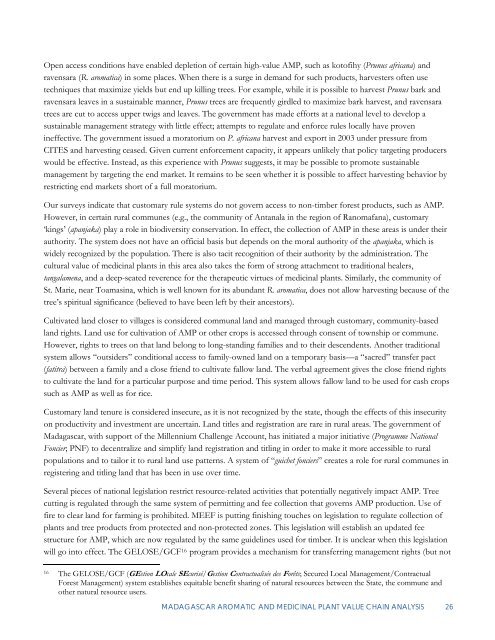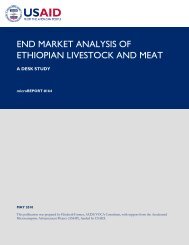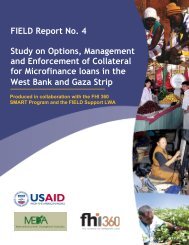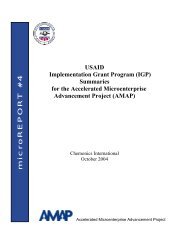Madagascar Aromatic and Medicinal Plants Value - Microlinks
Madagascar Aromatic and Medicinal Plants Value - Microlinks
Madagascar Aromatic and Medicinal Plants Value - Microlinks
Create successful ePaper yourself
Turn your PDF publications into a flip-book with our unique Google optimized e-Paper software.
Open access conditions have enabled depletion of certain high-value AMP, such as kotofihy (Prunus africana) <strong>and</strong><br />
ravensara (R. aromatica) in some places. When there is a surge in dem<strong>and</strong> for such products, harvesters often use<br />
techniques that maximize yields but end up killing trees. For example, while it is possible to harvest Prunus bark <strong>and</strong><br />
ravensara leaves in a sustainable manner, Prunus trees are frequently girdled to maximize bark harvest, <strong>and</strong> ravensara<br />
trees are cut to access upper twigs <strong>and</strong> leaves. The government has made efforts at a national level to develop a<br />
sustainable management strategy with little effect; attempts to regulate <strong>and</strong> enforce rules locally have proven<br />
ineffective. The government issued a moratorium on P. africana harvest <strong>and</strong> export in 2003 under pressure from<br />
CITES <strong>and</strong> harvesting ceased. Given current enforcement capacity, it appears unlikely that policy targeting producers<br />
would be effective. Instead, as this experience with Prunus suggests, it may be possible to promote sustainable<br />
management by targeting the end market. It remains to be seen whether it is possible to affect harvesting behavior by<br />
restricting end markets short of a full moratorium.<br />
Our surveys indicate that customary rule systems do not govern access to non-timber forest products, such as AMP.<br />
However, in certain rural communes (e.g., the community of Antanala in the region of Ranomafana), customary<br />
‘kings’ (apanjaka) play a role in biodiversity conservation. In effect, the collection of AMP in these areas is under their<br />
authority. The system does not have an official basis but depends on the moral authority of the apanjaka, which is<br />
widely recognized by the population. There is also tacit recognition of their authority by the administration. The<br />
cultural value of medicinal plants in this area also takes the form of strong attachment to traditional healers,<br />
tangalamena, <strong>and</strong> a deep-seated reverence for the therapeutic virtues of medicinal plants. Similarly, the community of<br />
St. Marie, near Toamasina, which is well known for its abundant R. aromatica, does not allow harvesting because of the<br />
tree’s spiritual significance (believed to have been left by their ancestors).<br />
Cultivated l<strong>and</strong> closer to villages is considered communal l<strong>and</strong> <strong>and</strong> managed through customary, community-based<br />
l<strong>and</strong> rights. L<strong>and</strong> use for cultivation of AMP or other crops is accessed through consent of township or commune.<br />
However, rights to trees on that l<strong>and</strong> belong to long-st<strong>and</strong>ing families <strong>and</strong> to their descendents. Another traditional<br />
system allows “outsiders” conditional access to family-owned l<strong>and</strong> on a temporary basis—a “sacred” transfer pact<br />
(fatitra) between a family <strong>and</strong> a close friend to cultivate fallow l<strong>and</strong>. The verbal agreement gives the close friend rights<br />
to cultivate the l<strong>and</strong> for a particular purpose <strong>and</strong> time period. This system allows fallow l<strong>and</strong> to be used for cash crops<br />
such as AMP as well as for rice.<br />
Customary l<strong>and</strong> tenure is considered insecure, as it is not recognized by the state, though the effects of this insecurity<br />
on productivity <strong>and</strong> investment are uncertain. L<strong>and</strong> titles <strong>and</strong> registration are rare in rural areas. The government of<br />
<strong>Madagascar</strong>, with support of the Millennium Challenge Account, has initiated a major initiative (Programme National<br />
Foncier; PNF) to decentralize <strong>and</strong> simplify l<strong>and</strong> registration <strong>and</strong> titling in order to make it more accessible to rural<br />
populations <strong>and</strong> to tailor it to rural l<strong>and</strong> use patterns. A system of “guichet fonciers” creates a role for rural communes in<br />
registering <strong>and</strong> titling l<strong>and</strong> that has been in use over time.<br />
Several pieces of national legislation restrict resource-related activities that potentially negatively impact AMP. Tree<br />
cutting is regulated through the same system of permitting <strong>and</strong> fee collection that governs AMP production. Use of<br />
fire to clear l<strong>and</strong> for farming is prohibited. MEEF is putting finishing touches on legislation to regulate collection of<br />
plants <strong>and</strong> tree products from protected <strong>and</strong> non-protected zones. This legislation will establish an updated fee<br />
structure for AMP, which are now regulated by the same guidelines used for timber. It is unclear when this legislation<br />
will go into effect. The GELOSE/GCF 16 program provides a mechanism for transferring management rights (but not<br />
16 The GELOSE/GCF (GEstion LOcale SEcurisé/Gestion Contractualisée des Forêts; Secured Local Management/Contractual<br />
Forest Management) system establishes equitable benefit sharing of natural resources between the State, the commune <strong>and</strong><br />
other natural resource users.<br />
MADAGASCAR AROMATIC AND MEDICINAL PLANT VALUE CHAIN ANALYSIS 26





